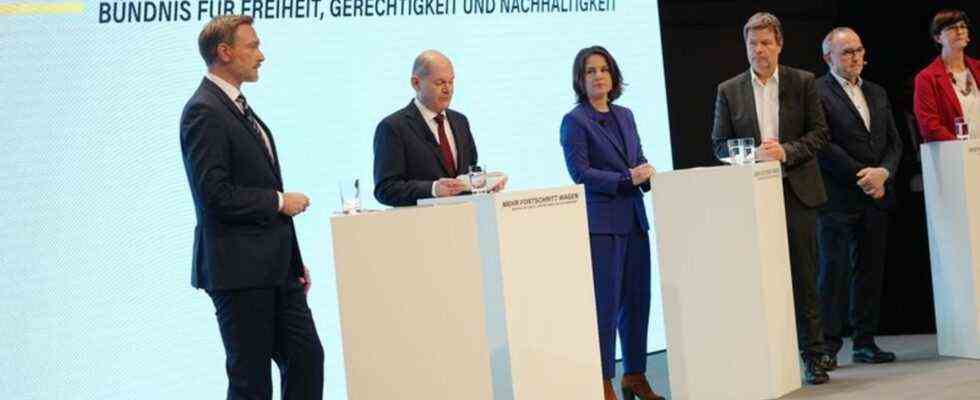SPD, Greens and FDP
This is what business says about the coalition agreement
The SPD, Greens and FDP have presented the coalition agreement – the economy is split. Photo: Kay Nietfeld / dpa
© dpa-infocom GmbH
It took two months – now there is a coalition agreement for the traffic lights. There is a lot of praise from business for the plans of the future government. However, there is also criticism.
A lot of fundamental praise for the coalition agreement between the SPD, Greens and FDP comes from the business world – and some criticism.
Many things point in the right direction, said employer president Rainer Dulger on Wednesday. Digitization, decarbonization and demographic change, however, require answers and a “big hit”, according to Dulger. “Unfortunately, this is not always recognizable in the coalition agreement.”
Among other things, the BDA president praised the abandonment of the traffic light to tax increases and the adherence to the debt brake. “Unfortunately, the traffic lights lacked the courage to go beyond the status quo to create new freedoms for companies and employees and to strengthen personal responsibility.”
Total metal: chance of a jolt
The employers’ association Gesamtmetall was also positive. The completely new government coalition has the chance to let go of a jolt through the country, said Gesamtmetall President Stefan Wolf. “We do not find every project necessary, not every chosen approach promising and some things may also be missing – but all in all the coalitionists took advantage of the opportunity.”
IG Metall boss Jörg Hofmann welcomed the fact that the future government is facing the great challenge of our time – the socio-ecological transformation. In addition, important issues such as industrial policy, active labor market policy and education would be addressed. However, the proposals for the further development of co-determination are too brief. And the big open question is: “How much additional public investment is necessary and how is it going to be financed? We are curious to see more concrete form through government reality, ”said the union leader.
Cautious criticism came from German industry. Overall, the contract contained too many vague declarations of intent, said Siegfried Russwurm, President of the Federation of German Industries (BDI). “Here the lion’s share of the work remains to be done.” Russwurm rated positively, among other things, the goal of a modern state. But it is important to push ahead with the implementation “with great ambition”: “The announced decade of future investments must become a reality.”
The coalition agreement was “shaped by a constructive spirit for the future,” said DIHK President Peter Adrian. However, there are still uncertainties for business practice. Above all, “the unclear financing issue for many projects” is critical.
“Most expensive common denominator”
The Federal Association of Medium-Sized Enterprises expressed itself more clearly: The traffic light parties had agreed on the “most expensive common denominator”, said the managing director of the Federal Association of medium-sized businesses, Markus Jerger. “The bill for this will be paid by businesses and citizens.” The various projects, such as the expansion of renewable energies, can only be financed through new borrowing without tax increases.
From various industry associations there is mainly applause for individual projects of the new government – for example from transport and bus companies, from the aviation industry, the shipbuilding industry and from logistics companies as well as from the startup association or from the computer game industry. The German Hemp Association and the Cannabis Industry Association welcomed the planned controlled distribution of cannabis to adults.
The trade association HDE sees many positive approaches, for example in the area of digitization and the development of city centers, but criticized the planned increase in the minimum wage: The sudden increase is an interference with the collective agreements in numerous industries.
BDEW: Reason for optimism
For the Federal Association of Energy and Water Management (BDEW), the coalition agreement is reason for optimism: it contains “a lot of substance, for example the planned immediate climate protection program can solve important knots”, said Kerstin Andreae, chairwoman of the BDEW management board. “It is important that the new federal government act quickly.”
When it comes to building and living, there is a mixed response: IG-BAU boss Robert Feiger, for example, welcomed the planned independent building ministry. That was “overdue”. The Central Association of the Building Industry (ZDB) made a similar statement. The tenants’ association welcomed the planned creation of new living space, but otherwise called the coalition agreement “inadequate”. “Obviously, the FDP has clearly prevailed in tenancy law,” said President Lukas Siebenkötten. This is not how you get ahead with effective tenant protection.

